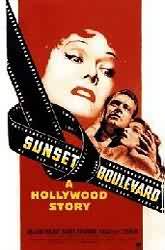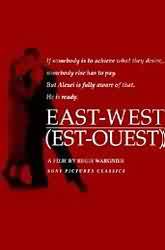 |
Sunset Blvd.
(Dir: Billy Wilder, Starring William Holden, Gloria Swanson, Erich von Stroheim, Nancy Olson, Fred Clark, Lloyd Gough, Jack Webb, and Cecil B. DeMille) BY: DAVID PERRY |
| Cinema-Scene.com > Volume 2 > Number 22 |
Cinema-Scene.com
Volume 2, Number 22
This Week's Reviews: Sunset Blvd., East-West.
This Week's Omissions: Big Momma's House, Croupier, Winter Sleepers.
 |
Sunset Blvd.
(Dir: Billy Wilder, Starring William Holden, Gloria Swanson, Erich von Stroheim, Nancy Olson, Fred Clark, Lloyd Gough, Jack Webb, and Cecil B. DeMille) BY: DAVID PERRY |
In 1976 there was a film called The Front starring Woody Allen as a front writer for those recently blacklisted in the 1950's. Though a nice film on its own front, it does stand as a nice throw-back to the long lost days before filmmaking become political, featuring many names whose lives changed when they too were blacklisted (including director Martin Ritt, writer Walter Bernstein, and actor Zero Mostel).
The Front was comparable to a gem that predated it by 26 years, a film not about politics ruining filmmakers, but instead of sound. Sunset Blvd. has been noted in so many genres, as a love triangle, as a crime drama, but I see it as a testament to the infallibility of the film viewing audience. Norma Desmond sits in her house with her recently deceased monkey and hulky, German-accented butler. No one remembers Norma as the starlet she was except Norma.
The film opens with a voice over from William Holden as Joe Gillis, lying on his chest in a swimming pool. Joe is dead, another victim of Hollywood's wicked forgetfulness. Sunset Blvd. is the story of how Joe Gillis finds himself floating as police and newspaper photographers have a field day.
Joe is yet another run of the mill screenwriter, having only made the B movies as quick pay-offs. He is out of money, with loan collectors literally knocking on his door to take his car. When he must make a getaway from those collectors after they spot him, Joe has a flat tire and hides his car in what looks like an abandoned mansion. It is not abandoned, it is the home of forgotten starlet Norma Desmond.
What begins as a mistaken identity between Joe and the undertaker brought in for Norma's dead monkey becomes a long lasting affair. Norma becomes the rich woman for Joe's gold digging habits. She has him rewrite the script to her comeback, Salome, in the house over the garage then move into the bedroom adjacent to hers to be her live-in lover. Joe does not really see her intentions until her much-touted New Years party, in which she and he are the only invited, but it is too late, he sees what he can get from this.
There are many more facets to this story, small notches that lead further towards a Norma's breakdown and Joe's death. The most important of these is the discovery of exactly who her butler Max is. Max von Mayerling is Erich von Stroheim, and vice-versa. The director of silent films broken down by what the studios would not let him do is the life of both of these people.
There is a moment in the film in which Max works the projector as Norma and Joe watch in her house. The film is Queen Kelly, the film that finally ended his career. Starring Swanson in her heyday, the film was their first and only work together as actress and director -- a decision that would tarnish both of their careers. Swanson and von Stroheim became such enemies that she used her clout to have him thrown off the picture and replaced with various directors, including Sam Wood, Edmund Goulding, and Irving Thalberg. Since von Stroheim owned the American distribution rights to the film, he had it remain unreleased in the United States and made her childish actions well known. Neither von Stroheim nor Swanson would be taken as a respected artist again until Sunset Blvd.
And here Billy Wilder sets the scene up to look at this moment in film history again. Max is at this moment in time watching what has been created as a creator above Swanson, a time too short since he must, of course, return to his duties as her butler.
I was most taken to von Stroheim in the film. Holden and Swanson both fight for the screen at every moment, as their characters should ask for, but it is that background of Max that is most engaging. He is a mere entity during the first half of the film, before his true meaning is made clear and he stands as one film history's greatest characters, one of more meaning than any other Billy Wilder film.
Wilder does a fine job directing the film, allowing it to progress at a steady pace. So often younger film viewers call old film like this stodgy and boring (though, I cannot recall the word stodgy ever coming from anyone under the age of 30), but there is not a moment when the film could be seen as such. Before writing this review I saw the film again with someone for the first time, age 18. He was literally enthralled at the end of the film, forgetting any thoughts of what films would be coming soon from Robert Zemeckis or the Farrelly Brothers, he was more interested in the cameo appearance from Cecil B. DeMille (who is joined with other silent stars in cameos including Anna Q. Nilsson, H.B. Warner, and Buster Keaton).
Visually the film is stunning with shots that are feast for the eyes. My personal favorite shots are the one of Joe's body from the bottom of the pool as the flashes of the cameras flare behind him and the one where Norma stands up with the light of the projector illuminating her face, but no one will ever forget the shot that is most memorable, the grand finale.
That same year, All About Eve was released
and received the Best Picture Academy Award. The two films can be compared quite
easily, but the wicked wit of Eve has never, in my mind, compared to the solemn
loss of Sunset.

| BUY THIS FILM'S FROM AMAZON.COM |
REVIEWS OF THIS FILM |
 |
East-West
(Dir: Régis Wargnier, Starring Sandrine Bonnaire, Oleg Menshikov, Sergei Bodrov, Jr., Catherine Deneuve, Ruben Tupiero, Erwan Baynaud, Tatyana Dogileva, Grigori Manukov, Bogdan Stupka, Meglena Karalambova, Atanass Atanassov, Tania Massalitinova, Valentin Ganev, and Nikolai Binev) BY: DAVID PERRY |
East-West (Est-Ouest) was a nominee this past year at the Academy Awards in the race of Best Foreign Language Film. Truthfully I cannot see why.
I sat in my barely attended screening of the film wondering when the pay-off would be, the moment in which I would know why this nomination was merited, and it never came. I did not think that the film was necessarily a horrible film, but I have seen far better.
East-West is a film about the placement of Western Civilization in the strict Communist East. Set in the midst of Stalin's reign of terror, the film is about one family caught in the Iron Curtain, him an expatriate Russian, her a steadfast Parisian. She decides to go with her husband, along with their small child Seryozha, due to their undying love.
But she does not know what she is getting into and what tests their love will go through. Stalin invited the many expatriates back to Russia with promises of open arms, only to execute them upon arrival. Alexei (Menshikov) and family are spared, only due to the fact that the government needs a doctor for the factories and Alexei happens to be in that field.
As workers of the state, they are given housing, without a choice. The small assemblage they get is filled with many unusual characters. Since wife Marie (Bonnaire) is French, she is automatically thought to be a spy, setting the stage for various people living in the same house as them to be informers -- when the kind old lady speaks in French to Marie, she is soon trucked off and assuredly executed. Both Alexei and Marie soon break apart, and each find a new lover in the house. For Marie it is swimmer Sacha (Bodrov, Jr.), whose dreams of freedom from the rule of the Soviets are in-line with her own.
Marie is stead-fast, and at times, hard to really like. Yes, she is like many previous headstrong female leads of the past, but she is so short-sighted that I spent the entire film really feeling bad for Alexei. The only reason the screenplay calls for him to commit adultery first is so that he can seem like a lesser person. Alexei strives to keep his family alive in the Communist state and she cannot see it. All she does is whine about getting out.
For that very reason I did not really feel much for Bonnaire's performance. To me, Menshikov was the far better of the two. Admittedly my timidness towards liking Bonnaire is more in characterization that performance, the same cannot be said for Bodrov, Jr., who gives a horrible performance that is only further pushed by the director's attempt to turn his character into the messiah.
The film is made like a vast epic, in the engaging style of David Lean, but it is not that vast, nor really that engaging. The way Régis Wargnier directs the film makes it seem so melodramatic that each scene comes off like a tepid overstatement.
At one point in the film, the viewer watches Sacha swim, a victory of which has been hinted as meaning his chance at freedom. The big, grand dramatic music jumps in and the heavy-handed direction goes full-force, to the point that when Sacha wins (I'm not giving away much, this is about the midpoint of the film), we have been made to think that all is great in the world. Then we learn that the win merely meant that he would be under consideration for the trip west.
Still, there are moments in the film where it does shine
on to the viewer. I was especially taken to a subplot involving an extreme leftist
French actress (as played by the great French actress Catherine Deneuve) who comes to the
aid of Marie in hopes of freeing her. There is one sequence in the vein of a great
thriller that is both thrilling and compelling. Too bad the same cannot be said for
the rest of the film.

| BUY THIS FILM'S FROM AMAZON.COM |
REVIEWS OF THIS FILM |
Reviews by:
David Perry
©2000, Cinema-Scene.com
http://www.cinema-scene.com